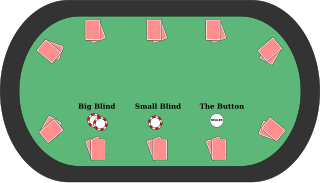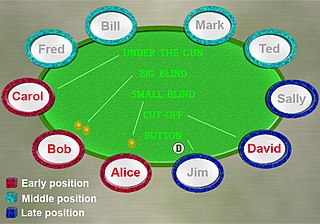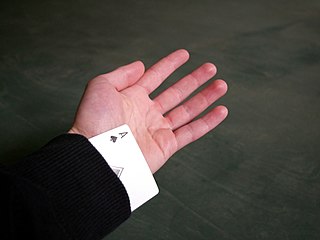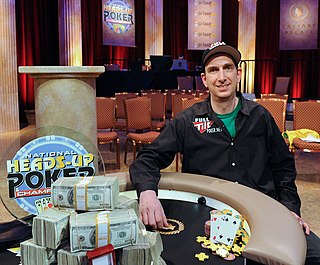
Poker is any of a number of card games in which players wager over which hand is best according to that specific game's rules in ways similar to these rankings. Often using a standard deck, poker games vary in deck configuration, the number of cards in play, the number dealt face up or face down, and the number shared by all players, but all have rules that involve one or more rounds of betting.

Blinds are forced bets posted by players to the left of the dealer button in flop-style poker games. The number of blinds is usually two, but it can range from none to three.
Position in poker refers to the order in which players are seated around the table and the related poker strategy implications. Players who act first are in "early position"; players who act later are in "late position"; players who act in between are in "middle position". A player "has position" on opponents acting before him and is "out of position" to opponents acting after him. Because players act in clockwise order, a player "has position" on opponents seated to his right, except when the opponent has the button and certain cases in the first betting round of games with blinds.

In the game of poker, the play largely centers on the act of betting, and as such, a protocol has been developed to speed up play, lessen confusion, and increase security while playing. Different games are played using different types of bets, and small variations in etiquette exist between cardrooms, but for the most part the following rules and protocol are observed by the majority of poker players.

Texas hold 'em is one of the most popular variants of the card game of poker. Two cards, known as hole cards, are dealt face down to each player, and then five community cards are dealt face up in three stages. The stages consist of a series of three cards, later an additional single card, and a final card. Each player seeks the best five card poker hand from any combination of the seven cards; the five community cards and their two hole cards. Players have betting options to check, call, raise, or fold. Rounds of betting take place before the flop is dealt and after each subsequent deal. The player who has the best hand and has not folded by the end of all betting rounds wins all of the money bet for the hand, known as the pot. In certain situations, a "split-pot" or "tie" can occur when two players have hands of equivalent value. This is also called a "chop-pot".

Cheating in poker is any behavior outside the rules that is intended to give an unfair advantage to one or more players.

A poker tournament is a tournament where players compete by playing poker. It can feature as few as two players playing on a single table, and as many as tens of thousands of players playing on thousands of tables. The winner of the tournament is usually the person who wins every poker chip in the game and the others are awarded places based on the time of their elimination. To facilitate this, in most tournaments, blinds rise over the duration of the tournament. Unlike in a ring game, a player's chips in a tournament cannot be cashed out for money and serve only to determine the player's placing.

Brag is an 18th century British card game, and the British national representative of the vying or "bluffing" family of gambling games. It is a descendant of the Elizabethan game of Primero and one of the several ancestors to poker, the modern version just varying in betting style and hand rankings. It has been described as the "longest-standing British representative of the Poker family."

Strip poker is a party game and a variation of the traditional poker where players remove clothing when they lose a round. Any form of poker can be adapted to a strip form; however, it is usually played with simple variants with few betting rounds, like five-card draw. Strip poker can be played by single-sex groups or by mixed groups in social situations and intended to generate an atmosphere of fun and to lighten the social atmosphere by the removal of clothing. Sometimes the game is played to heighten the sexual atmosphere, though the game itself is regarded as non-sexual. Like other adult party games, activities besides removing clothing and playing cards might be involved. Strip poker has also been adapted for a person to play alone, either by use of video games or online; and several television shows have been based on the game.

Heads-up poker is a form of poker that is played between only two players. It might be played during a larger cash game session, where the game is breaking up and only two players remain on the table, or where two players are trying to start a game and playing heads-up while waiting for other opponents. It is also a necessary phase in most sit-and-go (SNG) poker tournaments; the single remaining tournament winner will at some point have to face only a single opponent. Alternatively, heads-up poker may be played on purpose, either in a cash game format, or as a SNG, where two players play a winner-take-all tournament for a fixed, previously agreed upon amount of money. On larger online poker rooms and during certain tournament series, one may stumble upon larger heads-up tournaments, usually in the shoot-out format. Usually, in order to ensure the fairness of the game, all players finishing at the same level of the tournament bracket will be paid out the same amount of money, no matter what their finishing place is.
Texas Hold'em Bonus Poker is a casino table game, owned and licensed by Mikohn Gaming/Progressive Gaming International Corporation. The game is based on traditional multi-player Texas Hold'em poker, but differs in that there is no bet after the river card.

High Stakes Poker is an American cash game poker television program which was originally broadcast by the cable television network GSN and is now shown on PokerGO. The poker variant played on the show is no limit Texas hold 'em. The first 4 seasons ran from January 16, 2006 to December 17, 2007. The next 3 seasons ran from March 1, 2009 to May 21, 2011, and was simulcast in 3DTV on N3D. The eighth season was announced on October 30, 2020.
Teen patti is a gambling card game that originated in the Indian subcontinent and is popular throughout South Asia. It originated in the English game of three-card brag, with influences from poker. It is also called flush or flash in some areas.
In no-limit or pot-limit poker, a player's M-ratio is a measure of the health of a player's chip stack as a function of the cost to play each round. In simple terms, a player can sit passively in the game, making only compulsory bets, for M laps of the dealer button before running out of chips. A high M means the player can afford to wait a high number of rounds before making a move. The concept applies primarily in tournament poker; in a cash game, a player can in principle manipulate his M at will, simply by purchasing more chips.
Cash games, also sometimes referred to as ring games or live action games, are poker games played with "real" chips and money at stake, often with no predetermined end time, with players able to enter and leave as they see fit. In contrast, a poker tournament is played with tournament chips worth nothing outside the tournament, with a definite end condition, and a specific roster of competitors.
A hand history is a record of the action in an online poker hand. These records are generated by poker sites, and used internally to track player behavior and provide a verifiable log to resolve player disputes. If the poker site and client permit it, plain text versions of hand histories may be made available to players, which facilitates personal record-keeping and the sharing of interesting or problematic hands. A typical hand history will contain the following information:

PokerTracker Software, LLC is the name of a poker tool software company that produces the PokerTracker line of poker tracking and analysis software. PokerTracker's software imports and parses the hand histories that poker sites create during online play and stores the resulting statistics/information about historical play into a local database library for self-analysis, and for in-game opponent analysis using a real-time Head-up display.
The following is a glossary of poker terms used in the card game of poker. It supplements the glossary of card game terms. Besides the terms listed here, there are thousands of common and uncommon poker slang terms. This is not intended to be a formal dictionary; precise usage details and multiple closely related senses are omitted here in favor of concise treatment of the basics.
Poker is a popular card game that combines elements of chance and strategy. There are various styles of poker, all of which share an objective of presenting the least probable or highest-scoring hand. A poker hand is usually a configuration of five cards depending on the variant, either held entirely by a player or drawn partly from a number of shared, community cards. Players bet on their hands in a number of rounds as cards are drawn, employing various mathematical and intuitive strategies in an attempt to better opponents.
Ultimate Texas Hold 'Em is registered trademark of Bally Gaming, Inc. and refers to a reinvented variant of the classic poker game Texas hold 'em. In this variation, the player does not compete against other players. Instead, they play only against the dealer. At any point during the course of the hand, the player is free to make one raise. In this poker-based game, the earlier the raise is made, the higher its value is.